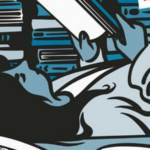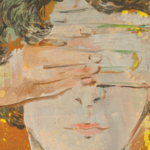I first heard about the film Hustlers on Twitter— I write the Justice Hustlers series of sex worker heist novels for Kensington Books, and, struck by the similarities, several readers had reached out to ask if my work had been adapted for the big screen. Some even wondered if my premise had been stolen. Neither one is true, although there has been some Hollywood interest in adapting my series for television. But the Hustlers film was adapted and directed by Lorene Scafaria, and is based on a true story. The original article ,written by Jessica Pressler, appeared in New York Magazine in 2015: “The Hustlers at Scores: Here’s a modern Robin Hood story for you: a few strippers who stole from (mostly) rich, (usually) disgusting, (in their minds) pathetic men and gave to, well, themselves.”
There are many similarities between Hustlers and my Justice Hustlers series. First of all, they are both stories of sex workers-turned-thieves with a brilliant and charismatic Latina crime boss. They both have an epicenter in New York City and both involve robbing wealthy white executives. Both stories center women of color, focusing on how women build family and take care of each other. But the biggest difference between Hustlers and Justice Hustlers is just that—the Justice part.
* * *
Hustlers is complex, because it follows a group of women who simultaneously pose a threat to capitalism, but are also unabashed entrepreneurs and consumers. The story opens prior to the financial crash of 2008. These women enjoy their strip club workplace: everyone is making money, and the compensation and camaraderie outweigh the exploitation and indignities built into the system. After the crash, however, the industry shifts. Dancers can no longer make a living without selling sexual services. In this new landscape, Ramona (played by Jennifer Lopez) begins a hustle of picking up men and bringing them to the club, then taking home a cut of everything they spend. Eventually the hustle escalates to drugging the men and maxing out their credit cards and hiring full-service sex workers to serve them in hotels. She takes Destiny (Constance Wu) under her wing for her new hustle, just like she did when they danced together at the strip club during the good times.
This critique of capitalism is ever-present in the movie. By turning to crime, the women break out of their prescribed place in the system: they are supposed to be sexy girls who offer pleasure and distraction for wealthy and powerful men. They are supposed to appear utterly happy to their clients, be nothing but grateful for whatever money those men offer for their services, and then hand over a disproportionate large cut to the club operators. When the economy is expanding, both workers and clients are happy—but when the economy contracts, the women are expected to accept heightened exploitation and mistreatment. Instead of accepting their fate, the women of Hustlers set and enforce the terms of the exchange, and extract from the clients who have historically extracted from them. Their decision to turn the tables on their clients is a feminist victory. Or is it?
In Andi Zeisler’s 2016 book, We Were Feminists Once: From Riot Grrrl to CoverGirl®, the Buying and Selling of a Political Movement, she coins the term “marketplace feminism,” which is a “a mainstream, celebrity, consumer embrace of feminism that positions it as a cool, fun, accessible identity that anyone can adopt.” Zeisler is the co-founder of Bitch Media, a 1990s zine turned magazine and website that looks at popular culture from an intersectional feminist lens. Zeisler’s book focuses mostly on capitalistic co-optation of feminism into “empowertising,” in which women are encouraged to consume products that promise to empower or rebrand us as feminists, such that “claiming an identity that’s feminist can stand in for actually doing work in the service of equality.”
Social justice isn’t something that can be consumed—which is one of the limitations of Hustlers.
Social justice isn’t something that can be consumed—which is one of the limitations of Hustlers. The title says it all: “a modern Robin Hood story [of] a few strippers who stole from…rich…men and gave to, well, themselves.” And what did they end up giving to themselves? The New York City “good life,” replete with opulent apartments, oversized gas-guzzling luxury cars, and designer fashion. The combination of their commitment to consumerism and the limited and individualistic scope of their operation puts them in alignment with marketplace feminism. And yet…
In Bitch Magazine, the title again says it all in Jourdain Searles’s review of the movie: “Family Ties: Hustlers Promises Crime, but Delivers Matriarchy.” There is something so satisfyingly subversive about women’s economic independence. In our worldwide economic system, women historically and currently own less than 1% of the world’s wealth. So when individual women figure out how to prosper despite the odds, we root for them. As a social justice activist, however, I want more from my stories. As Zeisler says, “we are letting a glossy, feel-good feminism pull focus away from deeply entrenched forms of inequality.” That is to say, a comprehensive feminist agenda can’t just be about individual winners, it needs to focus on what Elizabeth Warren has been calling “big, structural change.”
But Scafaria had to work with a true crime framework. These real-life women from the New York Magazine story didn’t take on national institutions of sexism, they took care of their families. And Scafaria tells their story with a female gaze through a feminist lens. I loved this movie. But I wanted more. I wanted them to use their skills in the service of something bigger. And above all, I wanted them to win. But they don’t win. In this true crime, their greed and dysfunction leads to their downfall.
* * *
But that may be precisely what fiction can offer. I am not a current or former sex worker, but a former non-profit worker. Part of Justice Hustlers had its origin in those long hours spent fundraising for various community organizations and wondering, why don’t we just rob a bank? It would take less time and energy. Of course, I didn’t do it because I would have gotten caught. But through the magic of fiction, I can create characters who can live out that fantasy and get away with it. In Justice Hustlers, the characters use their stolen money to take care of their basic needs, but then the surplus goes to support the Manhattan health clinic they run for poor women and sex workers. In each book, a portion of the money also goes to the communities from whom it was stolen, swindled, or extracted. While Hustlers is a satisfying revenge fantasy, it’s far from a restorative justice narrative. And, as Antonia Crane points out in her critical review, “sanctioned cultural messages [about sex workers] are: Strippers are bad….Strippers will rip you off. Hustlers is a story that instead of challenging these tropes, amplifies them. After all, this film is based on a true story about strippers who drugged and robbed clients blind—which is ugly, dangerous, and scary even if J.Lo makes it look glamorous and dope in a Chinchilla coat and fuckable car.”
Still, there’s something so unabashedly feminist about Hustlers. I call it an inverse Bechdel Test: Few of the men are named, no man has more than two or three lines, and they never exchange any lines with each other…
Still, there’s something so unabashedly feminist about Hustlers. I call it an inverse Bechdel Test: Few of the men are named, no man has more than two or three lines, and they never exchange any lines with each other—only with women. In contrast, my Justice Hustlers series gives much more airtime to men. Each novel has a heterosexual romantic arc, in which the man must overcome his investment in the patriarchy and pledge his loyalty to his female partner. It’s a feminist version of romance, but Hustlers, with its big money schemes and lack of developed male characters, really creates a world where women don’t need men. Except as robbery victims.
It makes sense that Hustlers can be read in different ways through the lens of feminism. Because sex work is one of the most controversial feminist issues. Major icons like Gloria Steinem have refused to use the term “sex work” and have insisted on using the term “prostitution” because they believe that selling sex is inherently exploitative, regardless of what the women selling sex have to say about it. On the other end of the spectrum, women—often working in the most lucrative parts of the industry—insist that sex work is empowering, while more marginalized sex workers often point out how such a perspective can come from a place of privilege. Sex workers who rob their customers are not only subjected to a spectrum of opinions about sex work, but also raise concerns about how their actions might contribute to anti-sex worker stigma. As Bubbles wrote in the sex worker blog Tits and Sass: “I understand the mixture of anticipation and dread with which strippers await[ed] Hustlers. What stupid misconceptions will it leave the audience with?…Will it portray all strippers as one national financial collapse away from forming a ring to drug customers, then max out their credit cards…?”
But I think Hustlers’ portrayal was profoundly empathetic. I believe it showed the very particular struggles of a particular group of women who were driven to these crimes by a system that didn’t allow them to make a legal living. At the end of the day, Hustlers is a moving and entertaining film about relationships between women.
And it’s a powerful adaptation of a true crime story. The UK Times dubbed it “The She-Wolf of Wall Street.” But that’s part of what makes it exciting, as far as how stories turn from print to screen. The “Wolf of Wall Street,” Jordan Belfort, stole huge sums from the public, then did time and turned around to write a commercially successful memoir which turned into a major Hollywood film. Since then, he has worked as a motivational speaker, receiving an estimated $30,000-80,000 per engagement. This story of women of color didn’t get any bigger than an article in a magazine. None of the women got book deals, let alone motivational speaking careers. But I’m excited to be living in a cultural moment when previously marginalized stories are starting to be told on the big screen, with women writers and journalists scripting the action, and women of color characters in the center of the storytelling.

















